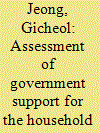| Srl | Item |
| 1 |
ID:
125748


|
|
|
|
|
| Publication |
2013.
|
| Summary/Abstract |
This paper investigates how Korean government support affects household adoption of renewable energy-based micro-generation systems by analyzing household preferences in relation to the costs and benefits of system installation and different kinds of government support. The research adopts a discrete choice experiment approach and focuses on two micro-generation technologies: solar voltaic and solar thermal. Our empirical analysis revealed firstly that households prefer micro-generation systems that have low installation costs but high energy saving benefits and long warranty periods; and secondly that households prefer direct subsidies to low-interest loans. However, we also found that households are reluctant to install photovoltaic or solar thermal systems in reality because they see the cost of system installation as being higher than the benefits they would receive from such installation. In short, while existing government supports are somewhat effective in promoting household adoption of micro-generation systems, there also exists the obstacle that the majority of households are unwilling to install such systems despite government support. Thus several policy improvements, which focus on increasing the benefits and decreasing the installation costs of micro-generation systems, are suggested in this paper.
|
|
|
|
|
|
|
|
|
|
|
|
|
|
|
|
| 2 |
ID:
111404


|
|
|
|
|
| Publication |
2012.
|
| Summary/Abstract |
Although the electric vehicle reduces pollutant emissions and results in reduced energy costs, lack of battery charging infrastructure and relatively high vehicle prices create challenges to the automobile industry and affect government support policies. To create a battery charging infrastructure, such as a vehicle-to-grid system, stakeholders need a quantitative analysis that decreases profitability uncertainty. The high cost of an electric vehicle can be offset by government subsidies that promote early marketing efforts, but an ex-ante evaluation of consumer demand is needed to analyze the effectiveness of any policy. This study provides information about optimal pricing based on consumer demand as well as the social welfare change effected by possible government subsidy polices for electric vehicles. Results show that the maximum profit for a vehicle-to-grid service provider will be 1.27 trillion Korean won/year with an annual subscription fee of 0.65 million Korean won. The government subsidy of 1 trillion Korean won, given annually, will increase social welfare by 1.94 trillion won and also boost the profit of vehicle-to-grid service provider to 1.98 trillion won.
|
|
|
|
|
|
|
|
|
|
|
|
|
|
|
|